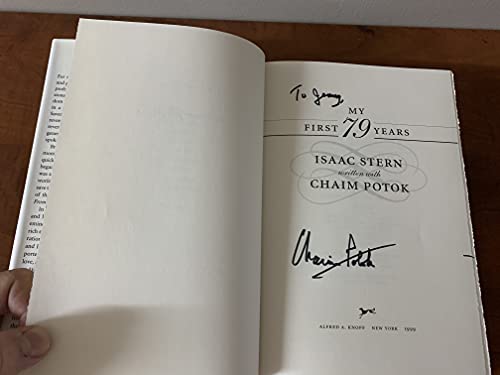
Sinossi
The world famous violinist describes his decades-long love affair with the world of music, his friendships with such notable colleagues as Leonard Bernstein and Pablo Casals, his ideas and beliefs about art and life, and his dedicated work with younger musicians
Le informazioni nella sezione "Riassunto" possono far riferimento a edizioni diverse di questo titolo.
Informazioni sull?autore
Isaac Stern is one of the most celebrated violinists of the century. He lives in Connecticut with his wife, Linda, and Gracie, the cat.<br><br>Chaim Potok is an ordained rabbi and has written many best-selling books, including <b>The Chosen</b> and <b>My Name Is Asher Lev</b>. He lives in Pennsylvania.
Dal risvolto di copertina interno
ur years, Isaac Stern has been a great--and greatly loved--performing artist, famous for his profound music-making, his gusto for life, his passionate dedication to sharing his knowledge and wisdom with younger musicians, and his determination in a good cause (Stern is, after all, The Man Who Saved Carnegie Hall). Indeed, there is no more revered musician in the world than Isaac Stern, revered not only as a great violinist but as a warm and generous personality and as a crucial figure and spokesperson in the world of the arts.<br><br>Brought to America from Russia when he was ten months old, Stern grew up in San Francisco and was quickly recognized as an extraordinary talent. He began performing publicly while still very young, and was soon touring across the country and around the world. His fame escalated when he led the fight to save Carnegie Hall, and again when he was the subject of the Academy Award-winning documentary film <i>From Mao to Mozart</i>.<br><br>In this book he shar
Le informazioni nella sezione "Su questo libro" possono far riferimento a edizioni diverse di questo titolo.
Altre edizioni note dello stesso titolo
Risultati della ricerca per My First 79 Years
My First 79 Years
Da: More Than Words, Waltham, MA, U.S.A.
Condizione: Very Good. A bright, square, and overall a nice copy. Codice articolo WAL-R-1e-01913
Compra usato
Quantità: 1 disponibili
My First 79 Years
Da: World of Books (was SecondSale), Montgomery, IL, U.S.A.
Condizione: Acceptable. Item in good condition. Textbooks may not include supplemental items i.e. CDs, access codes etc. Codice articolo 00070764637
Compra usato
Quantità: 1 disponibili
My First 79 Years
Da: World of Books (was SecondSale), Montgomery, IL, U.S.A.
Condizione: Good. Item in good condition. Textbooks may not include supplemental items i.e. CDs, access codes etc. Codice articolo 00059987708
Compra usato
Quantità: 1 disponibili
My First 79 Years
Da: Wonder Book, Frederick, MD, U.S.A.
Condizione: Very Good. Very Good condition. Good dust jacket. A copy that may have a few cosmetic defects. May also contain light spine creasing or a few markings such as an owner's name, short gifter's inscription or light stamp. Bundled media such as CDs, DVDs, floppy disks or access codes may not be included. Codice articolo P11G-01812
Compra usato
Quantità: 1 disponibili
My First 79 Years
Da: Wonder Book, Frederick, MD, U.S.A.
Condizione: As New. Like New condition. Very Good dust jacket. A near perfect copy that may have very minor cosmetic defects. Codice articolo D12A-03537
Compra usato
Quantità: 1 disponibili
My First 79 Years
Da: ThriftBooks-Phoenix, Phoenix, AZ, U.S.A.
Hardcover. Condizione: Very Good. No Jacket. May have limited writing in cover pages. Pages are unmarked. ~ ThriftBooks: Read More, Spend Less. Codice articolo G0679451307I4N00
Compra usato
Quantità: 1 disponibili
My First 79 Years
Da: ThriftBooks-Atlanta, AUSTELL, GA, U.S.A.
Hardcover. Condizione: As New. No Jacket. Pages are clean and are not marred by notes or folds of any kind. ~ ThriftBooks: Read More, Spend Less. Codice articolo G0679451307I2N00
Compra usato
Quantità: 1 disponibili
My First 79 Years
Da: ThriftBooks-Dallas, Dallas, TX, U.S.A.
Hardcover. Condizione: Very Good. No Jacket. May have limited writing in cover pages. Pages are unmarked. ~ ThriftBooks: Read More, Spend Less. Codice articolo G0679451307I4N00
Compra usato
Quantità: 1 disponibili
My First 79 Years
Da: ThriftBooks-Atlanta, AUSTELL, GA, U.S.A.
Hardcover. Condizione: Very Good. No Jacket. May have limited writing in cover pages. Pages are unmarked. ~ ThriftBooks: Read More, Spend Less. Codice articolo G0679451307I4N00
Compra usato
Quantità: 1 disponibili
My First 79 Years
Da: Better World Books, Mishawaka, IN, U.S.A.
Condizione: Good. 2nd printing. Former library book; may include library markings. Used book that is in clean, average condition without any missing pages. Codice articolo GRP78803612
Compra usato
Quantità: 3 disponibili

